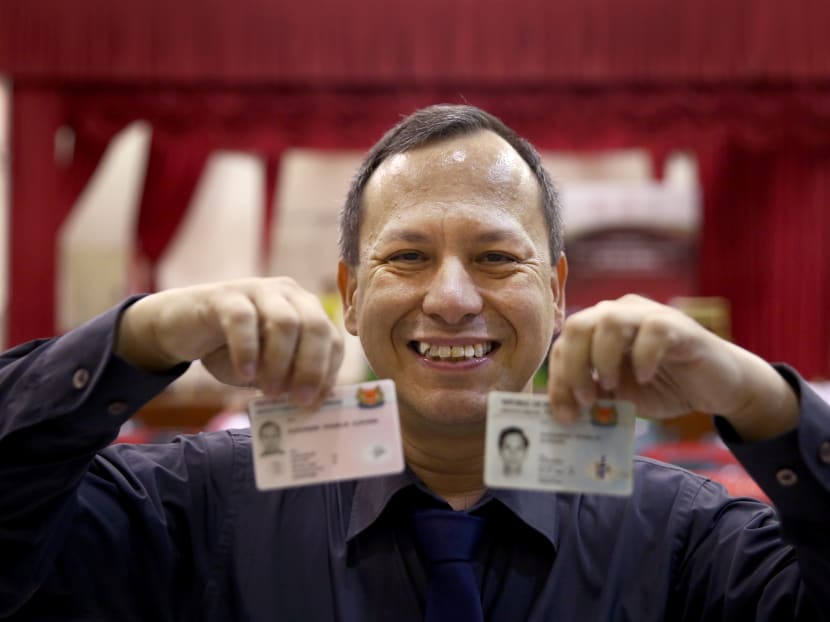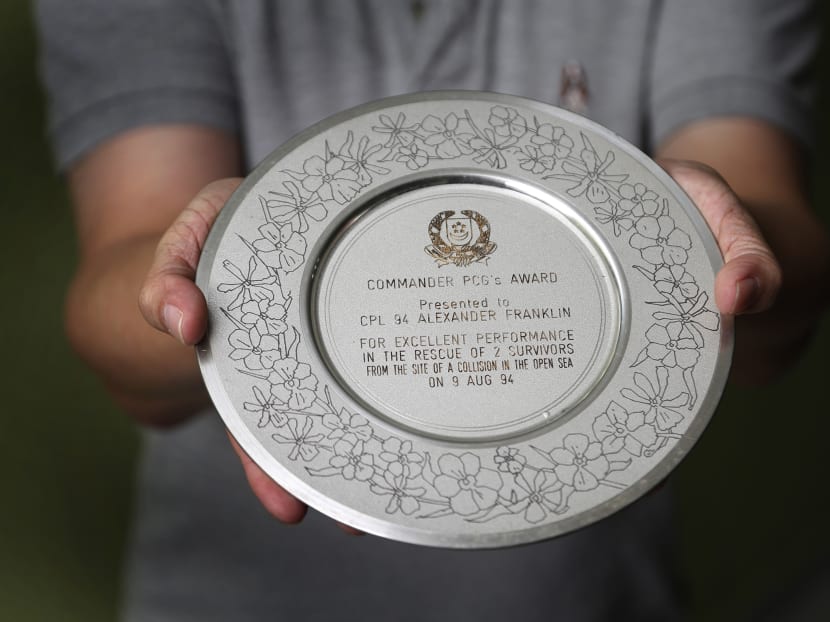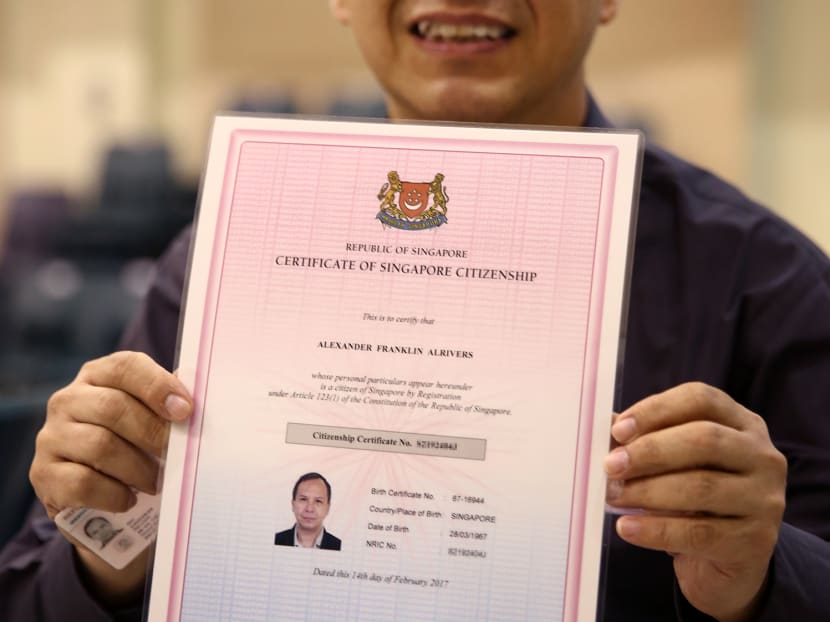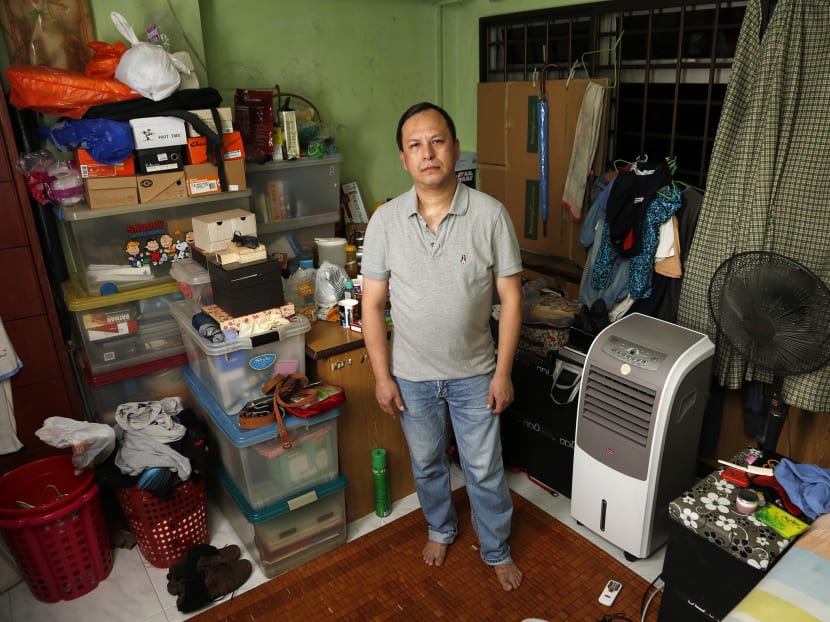From stateless to citizen: Finally a Singaporean after 50 years
SINGAPORE — Like any Singaporean male, Mr Alexander Franklin Alrivers served National Service (NS), as an infantry machine gunner, and even worked as a Police Coast Guard for 14 years.

Alexander Franklin Alrivers, 50, poses for a photo with his new pink Singaporean IC and his blue IC that indicated his nationality as "stateless". He had been stateless all his life until his application for citizenship was accepted this year. Photo: Nuria Ling/TODAY
SINGAPORE — Like any Singaporean male, Mr Alexander Franklin Alrivers served National Service (NS), as an infantry machine gunner, and even worked as a Police Coast Guard for 14 years.

The Eurasian, who was born here in 1967, was one of over 1,000 stateless people who are living in limbo here due to their unusual and complicated legal status.
The ICA declined to comment on how many stateless people go on to become citizens or how long the process takes. Its spokesman said all citizenship applicants are assessed based on prevailing eligibility requirements, with each application “carefully assessed on its own merits”.
On May 21, Mr Alrivers joined some 140 new citizens at a Citizenship Ceremony at Bukit Batok Community Club. As he sang the National Anthem and recited the National Pledge, he choked back tears at finally being able to call himself a Singaporean.
His immediate goals — to purchase a three-room resale Housing and Development Board flat and start a family with his 32-year-old Vietnamese wife.
The 50-year-old and his two sisters were born to two former Prisoners of War who met at Changi Prison during World War II. Their father was a Polish navy serviceman who was captured and interned by the Japanese after his ship got bombed. Their Malay mother was a nurse from Malaysia, caught for helping the British.
After Singapore gained independence, the couple were classified as stateless permanent residents who had lost their foreign citizenship. While their oldest child, born in 1954, was able to obtain citizen status with proof that she was born here, their two younger children, born post-1965, took on their stateless status.
The younger Ms Alrivers applied and received her pink IC at age 22, and Mr Alrivers was offered citizenship too when he turned 21 after serving NS.
But he turned it down on the advice of his elder sister and brother-in-law who were planning to emigrate to Australia.
Mr Alrivers, who had been living with them after his father died in a hit-and-run accident when he was 10, said: “I had no choice. I didn’t have a house or job at that time, so I said I would follow them wherever they go.”
The O-Levels certificate holder spent the next 29 years trying to undo that mistake as their plans failed to materialise, and he remained a stateless permanent resident in Singapore.
After more than 10 rejections and failed appeals with various Members of Parliament (MPs) to gain citizenship, in 2013, the security guard spent three months and S$2,500 to obtain a Workforce Skills Qualifications certificate in operating theatre support with the Institute of Health Sciences.
With that, he managed to secure a better-paying job as an operating theatre technical assistant at KK Women’s and Children’s Hospital, and he reapplied for citizenship in 2014 with a renewed sense of hope.
In January this year, he received a letter from the Immigration and Checkpoints Authority (ICA) notifying him that his application was approved. He took his Oath of Renunciation, Allegiance and Loyalty at ICA on Feb 14, and finally received his pink IC from Bukit Batok MP Murali Pillai on May 21.
At the new citizens’ ceremony for Jurong Group Representation Constituency and Yuhua and Bukit Batok Single Member Constituencies, Mr Alrivers was the only person jubilantly waving his documents on stage.

He had dressed for the occasion by donning a tie, the first time he did so outside his wedding, and secured it with a Republic of Singapore Air Force Black Knight F16 tie pin that he had purchased specially.
Although the ICA declined to comment why Mr Alrivers’ application took so long to be approved, for the 50-year-old, all his struggles are water under the bridge now. As a citizen, he can truly begin life anew.

He intends to purchase a resale HDB flat and move out the S$400-a-month cubicle that he and his wife of 13 years had called home for the last nine years. They also want two children and a pet dog.
As a stateless PR with a Vietnamese wife here on long-term pass, he put off having children for fear that their offspring would be caught in limbo like him.
He could not even visit his wife were she to return to Vietnam to give birth, as he said the Certificate of Identity, a Singapore-issued travel document for stateless individuals, has not been recognised by Vietnamese authorities for more than five years now.
With his red passport, he no longer needs to worry. In fact, he is making a trip in July with his wife to visit her parents in Ho Chi Minh City.
“This is my home now, and not just some place I am renting… This is where I will have children, die and be buried,” he said. “Best of all, I no longer owe anyone an explanation on why I am a Singapore PR even though I don’t come from some place else. Now I am just Singaporean. Full stop.”











